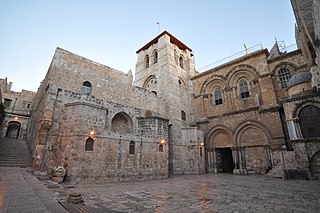Related Research Articles

Christianity is an Abrahamic monotheistic religion based on the life and teachings of Jesus of Nazareth. It is the world's largest and most widespread religion with roughly 2.4 billion followers representing one-third of the global population. Its adherents, known as Christians, are estimated to make up a majority of the population in 157 countries and territories. Most Christians believe that Jesus Christ is the Son of God, whose coming as the Messiah was prophesied in the Old Testament and chronicled in the New Testament, published together as the Christian biblical canon.

The Eastern Orthodox Church, also called the Orthodox Church and officially the Orthodox Catholic Church, is the second-largest Christian church, with approximately 260 million baptized members. It operates as a communion of autocephalous churches, each governed by its bishops via local synods. The church has no central doctrinal or governmental authority analogous to the head of the Catholic Church—the pope—but the Ecumenical Patriarch of Constantinople is recognized by them as primus inter pares. As one of the oldest surviving religious institutions in the world, the Eastern Orthodox Church has played a prominent role in the history and culture of Western Asia, the Caucasus, Eastern and Southeastern Europe.

Eastern Christianity comprises Christian traditions and church families that originally developed during classical and late antiquity in Eastern Europe, Southeastern Europe, Asia Minor, the Caucasus, Northeast Africa, the Fertile Crescent and the Malabar coast of South Asia, and ephemerally parts of Persia, Central Asia, the Near East and the Far East. The term does not describe a single communion or religious denomination.
Chalcedonian Christianity is a term referring to the branches of Christianity that accept and uphold theological resolutions of the Council of Chalcedon, the Fourth Ecumenical Council, held in 451. Chalcedonian Christianity accepts the Christological Definition of Chalcedon, a Christian doctrine concerning the union of two natures in one hypostasis of Jesus Christ, who is thus acknowledged as a single person (prosopon). Chalcedonian Christianity also accepts the Chalcedonian confirmation of the Niceno-Constantinopolitan Creed, thus acknowledging the commitment of Chalcedonism to Nicene Christianity.
The term Greek Orthodox Church has three meanings. The broader meaning designates "the entire body of Orthodox (Chalcedonian) Christianity, sometimes also called 'Eastern Orthodox,' 'Greek Catholic,' or generally 'the Greek Church'". The narrower meaning designates "any of several independent churches within the worldwide communion of (Eastern) Orthodox Christianity that retain the use of the Greek language in formal ecclesiastical settings". The third is the Church of Greece, the Eastern Orthodox church operating within the modern borders of Greece.

In ecclesiology, the Christian Church is what different Christian denominations conceive of as being the true body of Christians or the original institution established by Jesus. "Christian Church" has also been used in academia as a synonym for Christianity, despite the fact that it is composed of multiple churches or denominations, many of which hold a doctrinal claim of being the "one true church", to the exclusion of the others.

The East–West Schism, also known as the Great Schism or Schism of 1054, is the ongoing break of communion between the Roman Catholic and Eastern Orthodox churches since 1054. It is estimated that, immediately after the schism occurred, a slim majority of Christians worldwide were Eastern Christians; most of the rest were Western Christians. A series of ecclesiastical differences and theological disputes between the Greek East and Latin West preceded the formal split that occurred in 1054. Prominent among these were the procession of the Holy Spirit (Filioque), whether leavened or unleavened bread should be used in the Eucharist, the bishop of Rome's claim to universal jurisdiction, and the place of the See of Constantinople in relation to the pentarchy.

Eastern Orthodoxy, also known as Eastern Orthodox Christianity, is one of the three main branches of Chalcedonian Christianity, alongside Catholicism and Protestantism. Like the Pentarchy of the first millennium, the mainstream Eastern Orthodox Church is organised into autocephalous churches independent from each other. In the 21st century, the number of mainstream autocephalous churches is seventeen; there also exist autocephalous churches unrecognized by those mainstream ones. Autocephalous churches choose their own primate. Autocephalous churches can have jurisdiction (authority) over other churches, some of which have the status of "autonomous" which means they have more autonomy than simple eparchies.
John Anthony McGuckin is a British theologian, church historian, Orthodox Christian priest and poet.

The term Eastern Protestant Christianity encompasses a range of heterogeneous Protestant Christian denominations that developed outside of the Occident, from the latter half of the nineteenth century, and yet keep elements of Eastern Christianity, to varying degrees. Some of these denominations came into being, when existing Protestant churches adopted reformational variants of Eastern and Oriental Orthodox liturgy and worship. Some others are the result of reformations of Orthodox beliefs and practices, inspired by the teachings of Western Protestant missionaries. Some Eastern Protestant Churches are in communion with similar Western Protestant Churches. However, there is no universal communion between the various Eastern Protestant churches. This is due to the diverse polities, practices, liturgies and orientations of the denominations which fall under this category, as can be seen in Western Protestantism.
The History of the Eastern Orthodox Church is the formation, events, and transformation of the Eastern Orthodox Church through time.

Today 84% of the population in Georgia practices Orthodox Christianity, primarily the Georgian Orthodox Church. Of these, around 2% follow the Russian Orthodox Church, around 5.9% follow the Armenian Apostolic Church and 0.8% are Catholics and are mainly found in the south of Georgia but with a small number in its capital, Tbilisi.

The Catholic Church and the Eastern Orthodox Church have been in a state of official schism from one another since the East–West Schism of 1054. This schism was caused by historical and language differences, and the ensuing theological differences between the Western and Eastern churches.

Christianity in the Middle Ages covers the history of Christianity from the fall of the Western Roman Empire. The end of the period is variously defined. Depending on the context, events such as the conquest of Constantinople by the Ottoman Empire in 1453, Christopher Columbus's first voyage to the Americas in 1492, or the Protestant Reformation in 1517 are sometimes used.
Eastern Orthodoxy in Hungary refers to communities, institutions and organizations of the Eastern Orthodox Christianity in Hungary. Historically, Eastern Orthodoxy was an important denomination in the medieval and early modern Kingdom of Hungary. In modern times, Eastern Orthodoxy is mainly the religion of some ethnic minorities. In the 2001 national census, only 15,928 persons declared themselves Orthodox Christians.
Christianity became the official religion of the Roman Empire when Emperor Theodosius I issued the Edict of Thessalonica in 380, which recognized the catholic orthodoxy of Nicene Christians in the Great Church as the Roman Empire's state religion. Most historians refer to the Nicene church associated with emperors in a variety of ways: as the catholic church, the orthodox church, the imperial church, the imperial Roman church, or the Byzantine church, although some of those terms are also used for wider communions extending outside the Roman Empire. The Eastern Orthodox Church, Oriental Orthodoxy, and the Catholic Church all claim to stand in continuity from the Nicene church to which Theodosius granted recognition.

The term "Great Church" is used in the historiography of early Christianity to mean the period of about 180 to 313, between that of primitive Christianity and that of the legalization of the Christian religion in the Roman Empire, corresponding closely to what is called the Ante-Nicene Period. "It has rightly been called the period of the Great Church, in view of its numerical growth, its constitutional development and its intense theological activity."

Andrew Louth is an English theologian. He is an emeritus professor of patristic and Byzantine studies in the Department of Theology and Religion of Durham University. Louth has been at Durham University since 1996. Previously he taught at the University of Oxford and at Goldsmiths' College in Byzantine and early medieval history. He is a fellow of the British Academy and was a member of the British Academy Council from 2011 to 2014. He was President of the Ecclesiastical History Society (2009–10).

Moscow, third Rome is a theological and political concept asserting Moscow as the successor to ancient Rome, with the Russian world carrying forward the legacy of the Roman Empire. The term "third Rome" refers to a historical topic of debate in European culture: the question of the successor city to the "first Rome" and the "second Rome".
Christian devotional literature is religious writing that Christian individuals read for their personal growth and spiritual formation. Such literature often takes the form of Christian daily devotionals. Original excerpts including the Book of Daniel and Leviticus derive from Ancient Roman, Greek and Byzantine culture – and encompass the past relationship of God's Law through the Old Testament. Though these are the most significant accounts, the majority of the literature comprises commentaries to the ever changing social and political reforms of human history – including the impact of censorship, persecution – the reign of Emperor Nero and Diocletian and martyrdom on Christian life through the ages.
References
- ↑ Urbainczyk, Theresa (21 September 2016). "By Stephen Morris". The Journal of Theological Studies: flw118. doi:10.1093/jts/flw118.
- ↑ Bogomilova, Nonka (2016). "Review of Morris' "When Brothers Dwell in Unity": Byzantine Christianity and Homosexuality". Occasional Papers on Religion in Eastern Europe. 36 (5).
- ↑ Brakke, David (1 June 2017). "'When brothers dwell in unity'. Byzantine Christianity and homosexuality. By Stephen Morris . Pp. ix + 227 incl. 5 tables. Jefferson, NC: McFarland & Company, 2016. £43.95 (paper.) 978 0 7864 9517 7". The Journal of Ecclesiastical History. 68 (3): 606–606. doi:10.1017/S0022046917000367.
- ↑ Mitralexis, Sotiris (23 July 2019). "The Early Eastern Orthodox Church: A History, 60–1453, StephenMorris, McFarland & Company, 2018 (ISBN 978‐1‐4766‐7481‐0), vii + 184 pp., pb $45". Reviews in Religion & Theology. 26 (3): 484–486. doi:10.1111/rirt.13619.